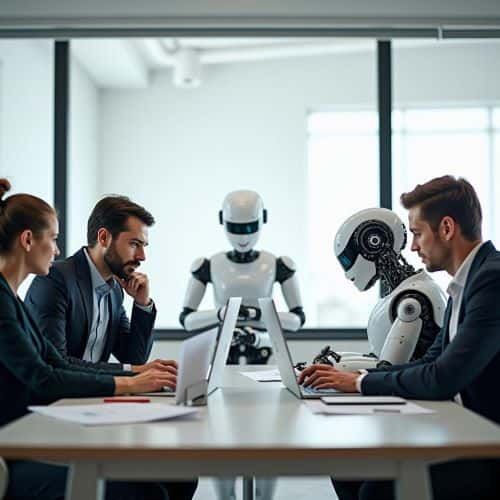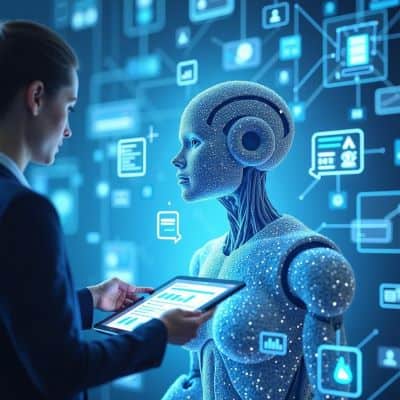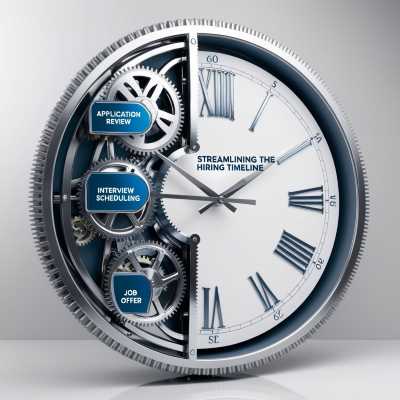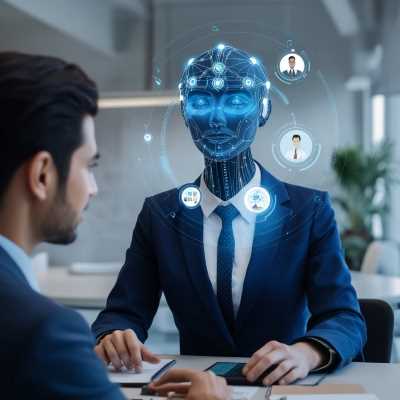Futuristic Recruitment: How AI is Revolutionizing Hiring Processes
Introduction
Recruitment has long been a complex and time-consuming process, often filled with inefficiencies, biases, and repetitive tasks. However, with the advent of AI technologies, businesses now have an unprecedented opportunity to streamline their hiring practices. AI-driven recruitment tools not only enhance efficiency but also elevate the quality of hires, paving the way for smarter, data-backed decisions.

The Rise of AI in Hiring
AI technology in recruitment goes beyond simple automation. It encompasses sophisticated tools capable of learning from data, analyzing patterns, and predicting future hiring outcomes. These tools allow companies to manage high volumes of applications, speed up recruitment cycles, and minimize human biases that often creep into hiring decisions.

AI-powered recruitment offers multiple benefits:
- Faster application processing
- Smarter candidate matching
- Elimination of unconscious bias
- Cost-effective recruitment cycles
Automating Key Recruitment Steps
AI makes it possible to automate various stages of the recruitment process, helping companies to operate with greater efficiency and less manual input.

Here are some of the ways AI is transforming key recruitment stages:
- AI-Enhanced Resume Screening: One of the most labor-intensive parts of hiring is sorting through applications. AI algorithms can quickly analyze resumes, identifying the candidates who most closely match the job requirements. By focusing on relevant skills, experience, and qualifications, AI screening ensures that recruiters can concentrate on top-tier talent, while filtering out applicants who don’t meet essential criteria.
- Intelligent Candidate Matching: AI tools go a step further than just screening by using natural language processing (NLP) and machine learning to match candidates with roles they’re best suited for. By comparing job descriptions and candidate profiles, AI ensures that each role is aligned with the most qualified applicants, reducing mismatches and speeding up the decision-making process.
- Automated Communication with Candidates: Engaging with candidates throughout the recruitment process can be a challenge for HR teams, especially in large-scale hiring. AI-powered chatbots can interact with candidates by answering questions, scheduling interviews, and even sending feedback on application statuses. This provides a consistent experience for candidates, keeping them informed and engaged while freeing up time for recruiters.
- Data-Driven Candidate Assessment: AI’s power lies in its ability to assess not just the immediate qualifications of candidates, but also their potential to succeed in a role long-term. By analyzing past hiring trends, AI tools can predict which candidates are likely to thrive in a particular environment, based on metrics such as job performance, tenure, and adaptability. This data-driven approach ensures more informed hiring decisions and lowers the risk of employee turnover.
Streamlining the Hiring Timeline
One of the most significant impacts AI has on recruitment is reducing the time it takes to hire candidates. The ability to automate tasks such as resume screening, scheduling, and communication ensures that hiring teams can move through each phase of the process more efficiently.

Benefits of Streamline the Hiring Timeline
- Reduced Time-to-Hire: By automating repetitive tasks, AI significantly cuts down the time needed to process applications and move candidates through the interview pipeline. Rather than waiting days or even weeks for manual sorting and follow-up, AI tools enable real-time decision-making, reducing time-to-hire and ensuring that companies can secure talent quickly.
- Enhanced Candidate Engagement: AI tools ensure candidates remain engaged throughout the hiring process by providing timely updates and personalized communication. Candidates appreciate faster response times, creating a more positive overall experience with the company, which can contribute to a stronger employer brand.
- Minimizing Recruitment Costs: The efficiency AI brings to recruitment reduces costs associated with unfilled positions, lost productivity, and the manual labor of sorting through large volumes of applications. By speeding up the recruitment cycle and improving the quality of hires, businesses also avoid costly hiring mistakes, leading to long-term savings.
Addressing Common Recruitment Challenges with AI
AI in recruitment addresses key challenges by efficiently managing large volumes of applications, reducing hiring bias through data-driven decisions, and ensuring compliance with labor regulations. By automating processes, AI helps streamline candidate selection, promote diversity, and maintain consistency, ultimately improving the overall hiring experience.

AI doesn’t just improve efficiency-it helps solve some of the most persistent:
- Handling Application Overload: When faced with hundreds or thousands of applicants, manual sorting becomes inefficient. AI tools can swiftly sift through massive data sets, identifying the most relevant candidates and ensuring no high-potential talent is missed due to overload.
- Reducing Hiring Bias: Human bias is one of the largest issues in traditional recruitment, often leading to missed opportunities and less diversity. AI technology, by focusing purely on data-driven insights, can minimize these biases, ensuring that the best candidates are chosen based on merit rather than subjective human judgment.
- Compliance with Labor Regulations: AI also helps businesses stay compliant with labor laws by creating structured and standardized processes. Automating recruitment workflows ensures all candidates are treated consistently, reducing the risk of non-compliance with employment regulations and minimizing potential legal risks.
AI and the Future of Recruitment
As AI continues to evolve, its impact on recruitment will only become more profound. Future advancements will likely see AI technologies tackling even more complex aspects of hiring, such as behavioral analysis, soft-skill assessments, and onboarding.

Here are some of the benefits AI brings to the future of recruitment
- AI-Driven Behavioral Analysis: In the future, AI will likely assess more than just a candidate’s hard skills. AI systems will be able to evaluate behavioral traits, emotional intelligence, and communication skills by analyzing candidate interactions during interviews. This will provide employers with a more comprehensive understanding of each candidate’s suitability for a role.
- Seamless Onboarding Integration: AI will not only streamline hiring but also extend into the onboarding process, helping new employees get up to speed more efficiently. AI-driven onboarding tools could provide personalized learning paths, automate paperwork, and integrate new hires into company culture from day one.
Conclusion
AI is fundamentally transforming the recruitment landscape, making the process faster, more efficient, and more accurate. By automating repetitive tasks, reducing bias, and enhancing the overall candidate experience, AI-driven recruitment platforms enable businesses to build stronger, more diverse teams while cutting down time-to-hire and costs. As AI technology continues to advance, companies that adopt these tools will have a significant edge in attracting and retaining top talent in an increasingly competitive marketplace.